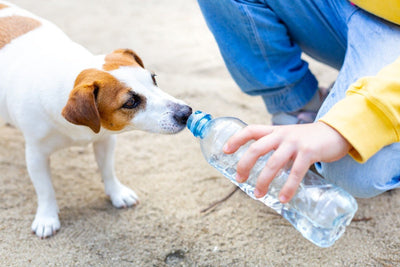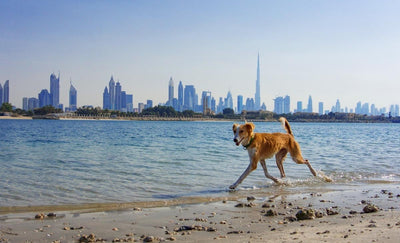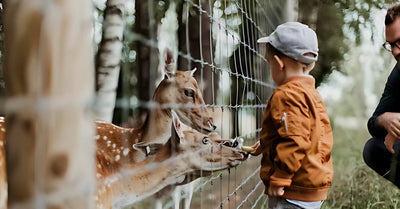 Spend AED 100 more for Free Shipping!
Spend AED 100 more for Free Shipping!
Moving with Pets in Dubai: Complete Checklist

Moving with Pets in Dubai: Complete Checklist
Relocating to Dubai with your pets involves strict rules and careful planning. Here's what you need to know:
- Start Early: Begin preparations at least six weeks before the move.
- Documents Required: Import permit (valid for 30 days; AED 200), health certificate (issued within 10 days of travel), vaccination records, and microchip details.
- Vaccination Rules: Rabies vaccination must be given at least 21 days before travel. Pets from high-risk rabies countries need a titer test.
- Customs Fees: AED 250 for cats and AED 500 for dogs. Inspection fees are AED 1,000 for dogs and AED 500 for cats.
-
Breed Restrictions: Certain breeds, like Pit Bulls and Mastiffs, are banned.

To ensure a smooth move, follow these steps:
- Housing: Choose pet-friendly areas like Jumeirah Village Circle or Dubai Marina.
- Travel Prep: Crate train your pet weeks in advance and avoid sedatives unless prescribed.
- Arrival: Set up a quiet, familiar space for your pet in your new home.
The process can be complex, but with proper planning and attention to detail, you can make the transition stress-free for you and your furry friend.
2025 | How To Relocate Your Dog To Dubai | Step-by-Step Guide for Pet Owners Moving to the UAE 🐶✈️
Dubai Pet Relocation Requirements
Dubai's pet relocation rules, overseen by the Ministry of Climate Change and Environment (MOCCAE), aim to ensure public safety and animal welfare. Below is a breakdown of the regulations, required paperwork, and customs procedures to help you navigate the process.
Dubai's Pet Import Regulations
MOCCAE permits each individual to import a maximum of two pets per year - this can be two cats, two dogs, or one of each. Age restrictions apply based on the pet's country of origin: pets from low-risk countries must be at least 12 weeks old, while those from high-risk countries must be 15 weeks or older. Additionally, certain breeds such as Pit Bulls, Mastiffs, and Japanese Tosas are banned from entry.
Required Documentation and Health Records
To bring your pet into Dubai, you’ll need a comprehensive set of documents and health records. Here's what you should prepare:
- Microchip: All pets must have a 15-digit ISO-compliant microchip that meets ISO standard 11784 or Annex A of ISO standard 11785.
- Vaccinations: Dogs must be vaccinated against canine distemper virus, and cats against feline rhinotracheitis. Vaccination records must include details such as the vaccine manufacturer, batch number, and the veterinarian’s signature.
- Rabies Antibody Test: Pets coming from high-risk rabies countries require a titer test showing antibody levels of at least 0.5 IU/ml.
- Parasite Treatment: Both internal and external parasite treatments should be administered at least two weeks before travel, with proof included in the health certificate and pet passport.
- Import Permit: Obtain an import permit from MOCCAE for AED 200. This permit is valid for 30 days from the date of issue .
- Health Certificate: A health certificate, issued within ten days of travel by a licensed veterinarian, is required. It must confirm the pet's microchip details and overall health status .
| Document Type | Validity Period | Key Requirements |
| Import Permit | 30 days from issue | MOCCAE approval; AED 200 fee |
| Health Certificate | 10 days from travel | Licensed vet signature; microchip verification |
| Rabies Vaccination | 21 days to 12 months | Manufacturer details; batch number |
| Titer Test | As specified by lab | Minimum 0.5 IU/ml for high-risk countries |
Customs Inspection and Entry Process
Once your paperwork is ready, you’ll need to prepare for customs inspection upon arrival. Pets must arrive as manifested air cargo at Dubai Airport. However, small cats and dogs flying with Etihad Airways to Abu Dhabi may be allowed in the cabin . Ensure you carry hard copies of all required documents to present to customs officials. Inspection fees are AED 250 for cats and AED 500 for dogs, payable at the airport.
A government veterinarian will examine your pet for communicable diseases, which may delay clearance by several hours. If your pet has layovers during travel, you’ll need to complete an attestation form confirming no contact with other animals during transit. To simplify the process, consider hiring a local transport agent in Dubai to handle customs clearance. If your pet is arriving outside regular business hours, notify veterinary officials in advance.
Preparing for the Move: Housing, Transportation, and Logistics
Once you've sorted out the legal paperwork, the next step in relocating with your pet to Dubai involves finding the right housing, planning a smooth travel experience, and ensuring a comfortable arrival. With over 1.5 million pet owners and more than 2 million pets calling Dubai home, preparation is key to making the transition as seamless as possible.
Finding Pet-Friendly Housing in Dubai
Navigating Dubai's property market as a pet owner can be tricky. Policies on pets vary significantly depending on the building, area, and property type. Villas and townhouses are often the best choice, offering spacious layouts and private outdoor areas that are perfect for pets. On the other hand, low-rise buildings tend to have more relaxed pet policies compared to high-rise towers.
Some of the most pet-friendly neighbourhoods include Jumeirah Village Circle (JVC), Dubai Marina, and The Greens. These areas often boast amenities tailored to pet owners and more lenient building rules. To start your search, check out real estate agencies, online property platforms, or social media groups geared toward pet owners.
When considering a property, make sure to review local regulations and building policies. Some may have restrictions on pet breeds, sizes, or the number of pets allowed. Carefully go through lease agreements, as pet-friendly properties may come with a 5–10% annual rent increase.
Be prepared with the necessary paperwork, including recent photos of your pet, updated vaccination records, and microchip details. It's also a good idea to contact landlords or property managers ahead of time to confirm their pet policies, saving you time and avoiding potential setbacks.
Location is another important factor. Look for homes near veterinary clinics, pet supply shops, and grooming services. Access to dog parks or pet-friendly walking areas can also make a big difference in your pet's quality of life. Once housing is sorted, your focus can shift to ensuring your pet's travel is as stress-free as possible.
Transportation Options and Pet Travel Preparation
Getting your pet used to their travel crate is one of the most important steps in preparing for the journey. Start crate training a few weeks before the move. Place the crate in a familiar spot at home, leaving the door open so your pet can explore it at their own pace. Gradually introduce short car rides in the crate to help them acclimatise.
"Proper preparation is key to a successful journey for both you and your beloved companion."
- Karyna, Owner of FurryTravel
The crate should be spacious enough for your pet to stand, turn around, and lie down comfortably. Adding familiar items like a blanket or a favourite toy can help them feel more at ease during the trip.
Adjust your pet's feeding schedule before the flight. The day before travel, feed them half their usual meal, and on the day of the flight, stick to water only. This helps avoid stomach issues during the journey while ensuring they aren't travelling on a completely empty stomach. A good exercise session before the flight can also help them stay calm.
Avoid sedatives unless your vet specifically recommends them. Safer alternatives include products like DAP collars for dogs or Feliway spray for cats, which can help reduce stress without the risks associated with sedation.
Pets typically travel in a ventilated, pressurised, and temperature-controlled cargo hold. Once you've ensured their comfort for the journey, it's time to prepare for their arrival and settling in.
Arrival Process and Settling In
After a well-planned journey, a structured arrival process will help your pet adjust to their new surroundings. Upon landing at Dubai International Airport, you'll need to navigate the customs process. Import duties are AED 500 for dogs and AED 250 for cats, while inspection fees are AED 1,000 per dog and AED 500 per cat. It's a good idea to confirm these fees in advance.
Once you've cleared customs, focus on immediate care for your pet. Offer water first, followed by a small meal - about ¼ of their usual portion. This helps prevent digestive issues after the trip.
Set up a quiet, comfortable space in your new home where your pet can relax. Keep familiar items like their bed or toys nearby and stick to their regular feeding and walking routines. The first few days may require some patience as your pet gets used to their new environment.
Reducing Pet Stress During the Move
Moving can be just as unsettling for pets as it is for humans. The sudden disruption of their routine and environment often leads to stress. To make the process smoother, early preparation and maintaining a sense of normalcy are crucial.
Keeping Familiar Items and Routines
Pets thrive on routine, and sticking to their usual schedule can provide a sense of stability during the chaos of moving. Start preparing weeks in advance by gradually introducing moving boxes and suitcases into their environment. This slow exposure helps them adjust without feeling overwhelmed. On packing day, leave your pet's belongings - like their bed, toys, and food bowls - until the very end.
During the move, designate a quiet room for your pet. Fill it with familiar items such as their bed, toys, and a piece of your clothing. These familiar scents can provide comfort amidst the unfamiliarity. Once you reach your new home, set up a cosy corner with these items right away to create a safe and welcoming space for your furry friend.
To further ease the transition, consider using calming aids tailored to your pet's needs.
Using Comfort Aids and Professional Services
There are several tools and strategies to help reduce your pet's anxiety during a move. Pheromone-based calming aids, such as sprays, collars, and diffusers, can be effective non-sedative options. For instance, products like Furbath+ Calming Spray for Dogs and Cats (AED 21.00) and ThunderEase calming solutions (around AED 92) are popular choices for managing pet anxiety. Playing soft music, speaking in soothing tones, and letting your pet explore their travel carrier or the moving vehicle beforehand can also help them feel more at ease.
If the process feels overwhelming, professional pet relocation services can be a lifesaver. These experts handle everything from transportation and accommodations to veterinary visits and paperwork, ensuring the move is as stress-free as possible for both you and your pet.
Helping Pets Adjust After the Move
The first few weeks in Dubai are critical for ensuring your pet feels comfortable and secure in their new surroundings. Every pet adjusts differently, but with a thoughtful approach, you can help them settle into their new home more smoothly.
Helping Pets Adjust to Their New Home
Start by setting up a cosy, quiet space just for your pet. Use familiar items like their bed, toys, and food bowls to create a comforting retreat where they can feel safe amidst the unfamiliar environment.
Introduce your pet to the new home gradually. Begin with one room and let them explore it fully before opening up access to other areas. This step-by-step approach can make the transition feel less overwhelming.
Establishing a consistent routine is essential. Stick to regular feeding times, walks, and bedtime schedules. Predictability can help reduce anxiety during this period of change.
Most importantly, shower your pet with extra attention and patience. Spend quality time playing, offering treats, and providing gentle reassurance to help them feel loved and secure in their new environment.
Once your pet feels more settled at home, the next step is to ensure you have access to the right resources and professional support for their continued well-being.
Finding Local Pet Services and Supplies
Building a reliable support network is essential for your pet's comfort and health during the transition. Dubai has a thriving pet-friendly community, offering plenty of options for care and supplies.
One of the first things you should do is locate a trusted veterinarian - ideally during your first week in Dubai. It's also wise to identify a 24/7 emergency clinic in case of unexpected health issues or accidents.
For daily essentials, local pet supply stores have you covered. Many even offer convenient online shopping and delivery services. For example, The Pets Club provides door-to-door delivery across the UAE, making it easy to stock up on everything your pet needs.
With these resources in place, you’ll be better prepared to monitor your pet's health and ensure a smooth adjustment.
Monitoring Health and Getting Expert Support
The stress of travel combined with Dubai’s warm climate can take a toll on your pet, especially in the first month after moving. Keeping a close eye on their health during this period is crucial.
Look out for signs of dehydration, such as excessive panting, lethargy, or a reduced appetite. If your pet isn’t used to hot weather, make sure they always have access to fresh water and avoid outdoor activities during the hottest parts of the day.
Behavioural changes can also indicate adjustment challenges or health issues. Watch for symptoms like a sudden loss of appetite, vomiting, diarrhoea, difficulty breathing, or unusual aggression. If you notice anything concerning, reach out to a veterinarian right away.
Even if your pet seems fine, scheduling a wellness check with your new vet within the first two weeks is a smart move. Routine care, including vaccinations, dental checks, and basic blood tests, can help establish a baseline for your pet’s health in their new environment and address any potential concerns early.
If you're ever unsure about your pet's condition, don’t hesitate to contact a veterinary clinic for guidance. With consistent monitoring, access to local support, and plenty of patience, your pet will soon feel right at home in Dubai.
Conclusion: Key Points for a Smooth Move
Relocating with pets to Dubai requires careful planning, strict adherence to regulations, and a focus on your pet's comfort. It's not just about completing forms - it's about ensuring your furry companion's journey is as safe and stress-free as possible. These efforts not only protect your pet's well-being but also help you manage the costs involved.
Start planning early and stay organised. Dubai's pet import regulations are strict, and fines for non-compliance can reach up to AED 5,000 per pet. The import permit issued by the Ministry of Climate Change and Environment is valid for just 30 days, so it's crucial to prepare all necessary documents in advance. This includes vaccination records, health certificates, and proof of microchipping .
Check for breed restrictions. Certain breeds are not allowed in Dubai, so verifying this beforehand can save you from the inconvenience and expense of denied entry.
Budget carefully. Factor in all costs, including the import permit, inspection fees, and veterinary certificate charges. If the process feels overwhelming, professional pet relocation services can provide valuable assistance to navigate these requirements.
Ease your pet’s travel stress. Dubai's warm climate and the travel process itself can be tough on pets, especially during the initial adjustment period. Sticking to familiar routines, bringing comfort items, and closely monitoring for signs of dehydration or behavioural changes can help your pet settle in more comfortably.
Seek professional support. Whether it’s working with pet relocation specialists or connecting with reliable local veterinarians, having the right support network can make the transition smoother. Stores like The Pets Club can also be a great resource for ongoing pet care needs.
With thorough preparation, attention to detail, and patience as your pet adjusts, the move to Dubai can mark the beginning of a happy and comfortable new chapter for both you and your furry friend.
FAQs
How can I ensure my pet stays comfortable and calm during a flight to Dubai?
To ensure your pet has a comfortable and stress-free flight to Dubai, start by getting them used to their travel crate well ahead of time. Turn the crate into a cosy retreat by adding a blanket that carries their scent, a favourite toy, or other familiar items that help them feel at ease. Don’t forget to pack essential items like a collapsible water bowl and any supplies they might need during the trip.
Plan to arrive at the airport early to give yourself enough time for check-in without the added pressure of last-minute rushes. It’s also a good idea to consult your veterinarian for tips on managing your pet’s travel anxiety. They might recommend calming remedies or even mild sedatives if necessary. Lastly, double-check that your pet’s vaccinations, microchip, and health certificates meet Dubai’s import requirements to avoid any issues when you land.
What should I consider when looking for pet-friendly housing in Dubai?
Finding Pet-Friendly Housing in Dubai
When you're on the hunt for pet-friendly housing in Dubai, certain communities stand out for their welcoming attitude towards pets. Areas like Dubai Hills Estate, Jumeirah Village Circle (JVC), and Arabian Ranches are great options. These neighbourhoods often include green spaces, parks, and walking paths, making them ideal for pet owners.
Make sure to focus on properties that clearly state they allow pets. Be aware of any extra fees or restrictions that might apply. Homes with outdoor spaces, such as gardens or balconies, can provide added comfort for your pet. Living close to pet-friendly amenities, like veterinary clinics, pet stores, and grooming services, can also make a big difference in your daily routine.
By keeping these points in mind, you can find a home that suits both you and your furry companion perfectly.
How can I help my pet adjust to Dubai's climate and environment after moving?
Adjusting your pet to Dubai's climate and surroundings takes time, care, and a bit of planning. The intense heat and humidity, especially in the summer, can be tough on animals. To help them acclimatise, start by taking them outdoors during the cooler parts of the day - early mornings or evenings are best. Make sure they always have plenty of fresh water and access to shaded spots to avoid overheating.
Bringing along familiar items like their favourite blanket, toy, or bed can make the transition smoother and help them feel more at ease. Try to stick to their regular feeding and exercise schedule as much as possible to give them a sense of routine and stability. While pets usually adjust over time, keep an eye on their behaviour. If they seem unusually stressed or uncomfortable, don’t hesitate to reach out to a veterinarian for advice.

 Facebook
Facebook



